The CMP Review — Week of December 9
December 9, 2024
A relaxed family tradition we love is wrapping 25 Christmas picture books and reading one each day in December, leading up to Christmas Day. The kids take turns picking and unwrapping the book for the day. There’s no specific order or plan—just a fun surprise each time!
We already have an abundance of Christmas books, so I don’t buy new ones for this. We simply wrap until we reach 25. Most years, we don’t get through them all—and that’s okay! It gives us a head start for next year (or saves us from last-minute wrapping on November 30).
This year, we spent the first week of December sick, so the leftover wrapped books from last year were perfect. Yesterday, we wrapped just enough to finish out the month.
It’s an easy, relaxed, and low-pressure tradition.
Didn’t start until December 15? No problem. Only read 11 of the 25 books? No worries. The goal isn’t perfection—it’s simple moments of joy and connection.
@tessakeath
December 10, 2024
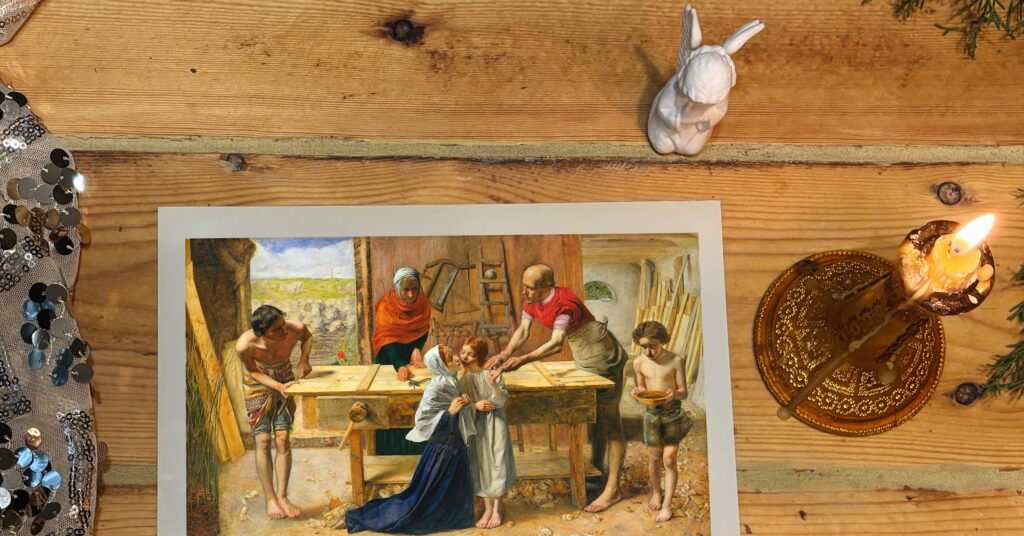
“With the season of Advent our thoughts turn naturally to that blessed mystery of our Faith—the Incarnation of our Lord Jesus Christ,” wrote Charlotte Mason in 1910. It’s a wonderful description of what this season means to so many of us: a time for quiet and deep reflection on a mystery that never surrenders its full meaning.
As Charlotte Mason considered the deep truths of the faith, she seemed to be drawn to the sermons of Rev. Francis Lewis, a fellow Ambleside resident and educator. She arranged for several of his sermons to be printed in the Parents’ Review, and these sermons often emphasize themes that we see in Miss Mason’s writings.
This Advent season, the Charlotte Mason Poetry team is sharing a series of three sermons written by Francis Lewis and recorded by Greg Rolling. These sermons each relate in different ways to the mystery of the incarnation and speak to the hearts of parents and teachers today.
Today we share the first, entitled “The Nobility of Work,” in which Lewis meditates on how “the example of our Saviour at work in the carpenter’s shop at Nazareth.” He shows us that “even the humblest task is a kind of sacrament; the outward means through which spiritual grace is manifested and conferred.” Read or hear this timeless sermon here.
@artmiddlekauff
December 11, 2024

“Children should have the joy of living in far lands, in other persons, in other times — a delightful double existence; and this joy they will find, for the most part, in their story-books.”
~Charlotte Mason, Home Education
@rbaburina
Image @aolander
December 12, 2024
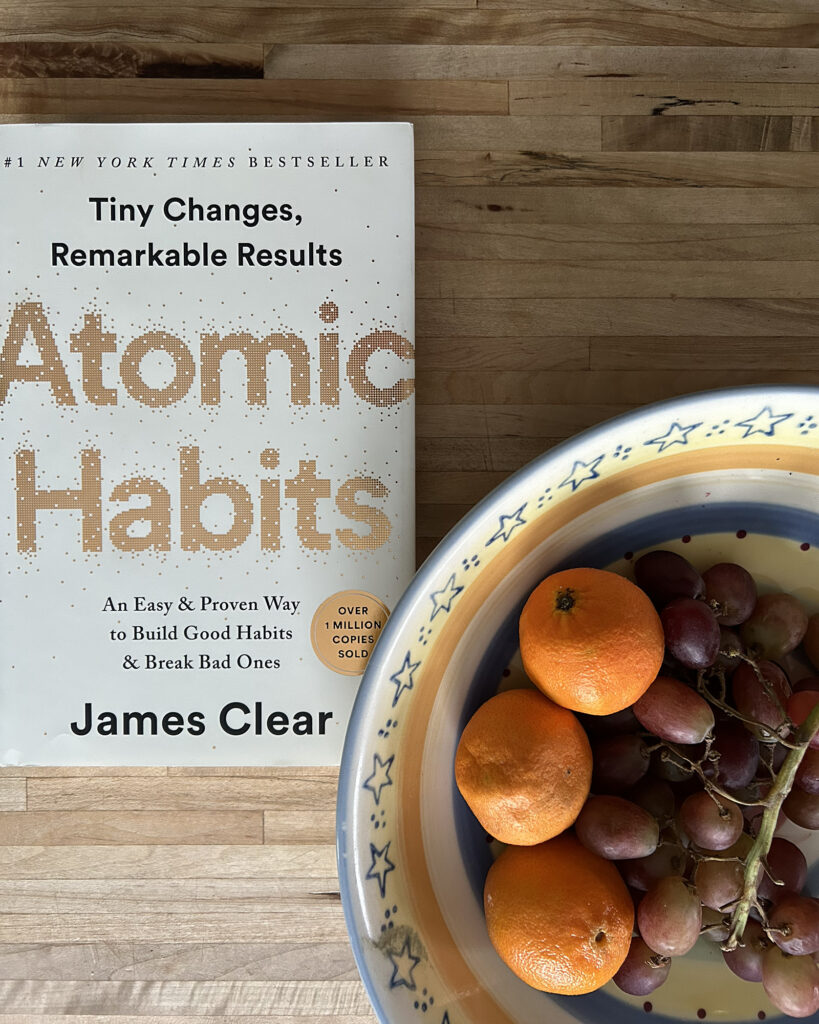
Charlotte Mason asserts that “power of will implies power of attention.” For many people, this sounds odd. What does the habit of attention have to do with willpower? I think we find a clue in James Clear’s Atomic Habits. He tells this story:
I used to buy apples from the store, put them in the crisper in the bottom of the refrigerator, and forget all about them. By the time I remembered, the apples would have gone bad. I never saw them, so I never ate them. Eventually, I … redesigned my environment. I bought a large display bowl and placed it in the middle of the kitchen counter. The next time I bought apples, that was where they went—out in the open where I could see them. Almost like magic, I began eating a few apples each day simply because they were obvious rather than out of sight.
Clear’s point is that willpower is overrated. “When scientists analyze people who appear to have tremendous self-control,” he explains, “it turns out those individuals aren’t all that different from those who are struggling. Instead, ‘disciplined’ people are better at structuring their lives in a way that does not require heroic willpower and self-control.”
It’s great advice to redesign our environments so that good habits are encouraged and bad habits are discouraged. But what about when we can’t control our environment? When our environment is handed to us by someone else? What then? Miss Mason has the answer:
Are you cross? Change your thoughts. Are you tired of trying? Change your thoughts. Are you craving for things you are not to have? Change your thoughts; there is a power within you, your own will, which will enable you to turn your attention from thoughts that make you unhappy and wrong, to thoughts that make you happy and right. And … this is the sole secret of the power over himself which the strong man wields—he can compel himself to think of what he chooses, and will not allow himself in thoughts that breed mischief.
We can’t always change our environment, but we can always change our thoughts. And by the habit of attention we can hold these thoughts steady. And then we find a power of will we never knew we had.
@artmiddlekauff
December 13, 2024
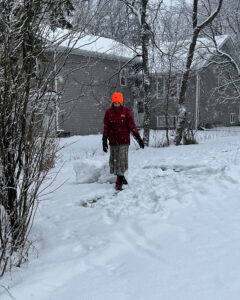
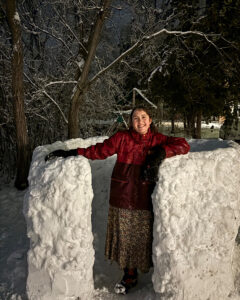


The gift of a day well above freezing when we didn’t expect it!
Serafina set to work on something to take advantage of the snow’s packability and she built this amazing fort.
I took this first photo at 3:30pm and the second photo at 5:50pm. (At some points during that time, she was also joined by various neighbourhood friends.)
The temperature dipped well below freezing again by the morning. Later that day, she and a friend decided to put a roof on it, using some branches, some tall grasses, with some (no longer sticky. Not at all. Not even to just pack a snowball) snow overtop. Scroll further to see these pics.
With the kind of winters we have, this fort (and later, its ruins) will stay with us until the end of April! 🧊 ❄️ 🥶
@antonella.f.greco
December 14, 2024

Stopping by Woods on a Snowy Evening
Whose woods these are I think I know.
His house is in the village though;
He will not see me stopping here
To watch his woods fill up with snow.
My little horse must think it queer
To stop without a farmhouse near
Between the woods and frozen lake
The darkest evening of the year.
He gives his harness bells a shake
To ask if there is some mistake.
The only other sound’s the sweep
Of easy wind and downy flake.
The woods are lovely, dark and deep,
But I have promises to keep,
And miles to go before I sleep,
And miles to go before I sleep.
(Robert Frost)
@antonella.f.greco
December 15, 2024
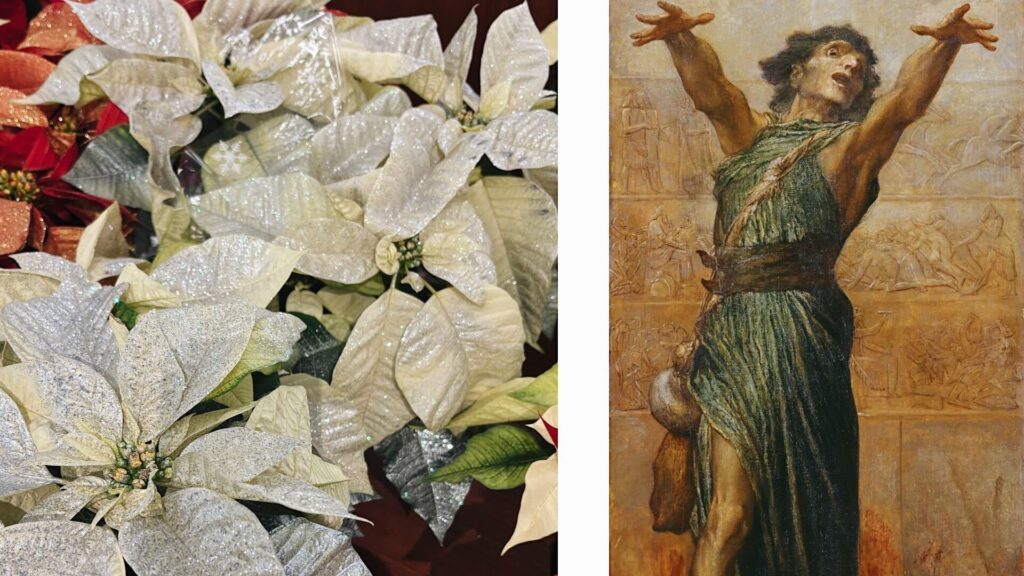
When Charlotte Mason assembled her volumes of original poetry, she always chose a dozen or so paintings by the great masters to illuminate certain poems and passages of Scripture. Many familiar artists were represented, including Titian, Rembrandt, and Dürer.
When she published her sixth volume of poetry in 1914, she may not have known that it would be her last. This volume included a print of her beloved Fortitude by Botticelli which she discussed at length in Ourselves. But when it came to the poem “The Sign of Jonah,” she chose something quite different.
Though in Home Education she recommended illustrations by “the Old Masters” to accompany Bible lessons, for this poem she selected a painting executed in 1894 — a mere 20 years before the publication of her work.
It is hard to fully grasp this when we normally think of Charlotte Mason as associated with old-fashioned things. How many devotees of the old masters today would choose a painting from 2004 to appear 80 pages away from a piece by Botticelli?
In 1904, G. K. Chesterton wrote an appreciation of artist G. F. Watts. He described Watts’s painting of Jonah as “frame-filling violence.” When Charlotte Mason wished to illustrate Christ’s proclamation that “a greater than Jonah is here,” she chose this piece by Watts instead of a work by any old master.
Perhaps it was the best painting available. Or perhaps it was a reminder by Miss Mason that the kingdom of heaven is like a householder who brings out of his treasure things new and old. Read or hear “The Sign of Jonah” here.
@artmiddlekauff